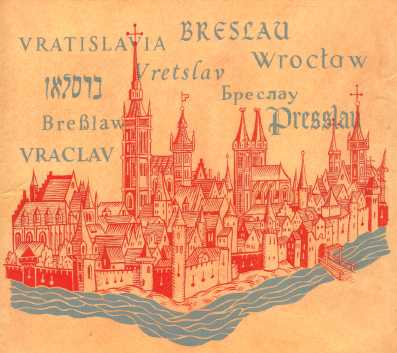
Breslau
Breslau is a place within Central Europe which constantly recurs in the description of the origins of the Cassirer family. But places in Central Europe, especially Breslau, have had a habit of finding themselves moved from one national identity to another, and have also suffered consequent name changes. Indeed Breslau (now Wroclaw, Poland) has changed identity so many times that in their book "Microcosm" (Norman Davies and Roger Morhouse, Microcosm: Portrait of a Central European City, Jonothan Cape, London, 2002) the authors resort to simply referring to it as "the Island City". It is useful to make some brief comment about this city here (almost all of which is drawn from Microcosm and to which page numbers in [] refer).

[from cover of Microcosm]
Breslau has had many names - Vratislavia (the name introduced 1,000 years ago by Latin speaking clergy [p. 12]), Vrestlav, Vraclav, Presslau, and Wroclaw, are to name but a few of the fifty which one could chose from. It lies in a region still known as Silesia - a part of central Europe which easily precedes the idea of "Germany" which only really solidified in the late 18th and early 19th Century.
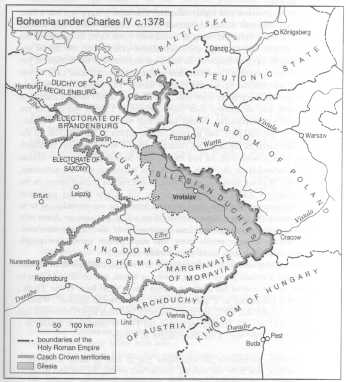
Map showing the Silesian duchies in 1378. [p. 111]
Prior to the the mid-18th Century, "Bresslau" was a "semi-independent city-state, enjoying ancient privilege and freedoms. Its political alignments always came about by consent. It had never been captured by enemy forces... Frederick the Great would rob Bresslau of its innocence. After his arrival, its ancient freedoms were doomed."[p. 252] One of the points stressed in Microcosm is that two images of Breslau are often placed in tension - 'German Breslau' and 'Polish Wroclaw'. The reality is of a mixed and shifting population with by now multiple languages, identities and religious beliefs which has been buffeted, mixed and defused over many generations of shifting political administrations and structures, and waves of forced emigration and emigration."
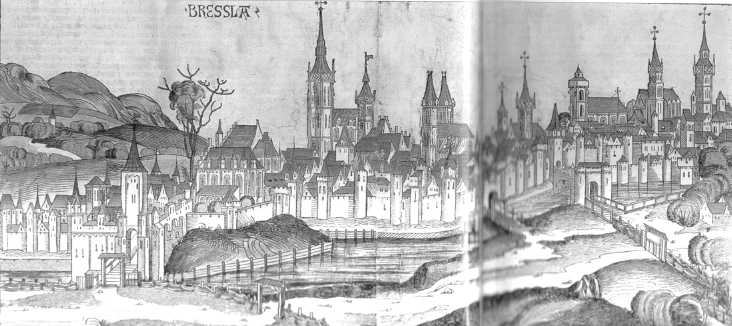
Breslau in 1550 as illustrated in Sebastian Munster's Cosmographica [p. 236, insert]
Judaic law forbade Jews living close to Gentiles, so inevitably Jews clustered into sub communities where they were in close proximity to each other, and where convenient access could be constructed to synagogue, kosher food and other ritual needs.[p. 92] A sketch of the Jewish Quarter in Breslau's Karlsplatz around the turn of the 18th century is shown below.
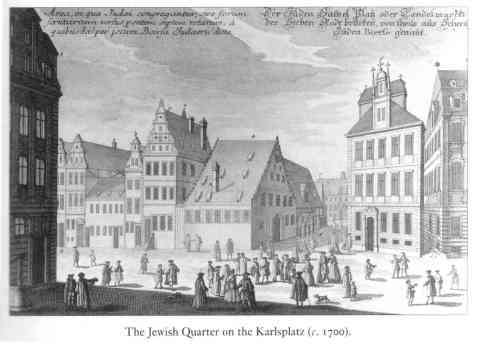
Jewish Quarter in Breslau's Karsplatz, about 1700. [p. 236, insert]
The Treaty of Versailles in 1871 proclaimed the defeat of France and the victory of the Prussian armies. The empire that was created was not a single monolithic state but a voluntary association of twenty five rulers including kings, dukes, senates and free cities.[p. 267] However the Prussian power, under the Chancellorship of Bismark, and the rule of the Reichstag, was soon to dominate the entire country. The years that followed were times of economic boom - the Gründerjahre (Founder's Years) or Gründerzeit (Time of Foundation). Despite a cycle of boom and bust Upper Silesia which produced coal, iron and timber saw significant injections of capital and rapid economic growth from the mid 1850s to the end of the century. By 1871 Breslau was the third biggest city in terms of population in the new German empire.[p. 282] By 1910, although its population was still growing, other cities such as Leipzig, Munich and Dresden were outstripping it.
Breslau had a powerful university and polytechnic. By the 1890s Breslau's reputation as a seat of learning had begun to grow. It attracted artists and academics with national reputations and the arts prospered also in the intellectual atmosphere. "Breslau was transformed from a solid centre of national standing into a cultural star of international splendor."[p. 289] From 1902-1994 Breslau citizens earned ten Nobel Prizes, (two scholars of literature, three chemists, three physicists, one economist, and one medical researcher). [p. 298]
The Jewish population was prominent in both the intellectual and commercial world of Breslau. It had a generally liberal ideology, and was as a rule well assimilated into sharing Prussian as well as Jewish identity. However, by the late stages of the 19th Century this crystallization of identity began to be undermined from outside.
The word 'anti-Semitism' was coined in 1879 by the radical author Wilhelm Marr, in Der Sieg des Judenthums über das Germanenthum ('The victory of Jewry over Germandom'). It marked a departure from the traditional types of religious or cultural prejudice. It postulated a new secular, racist, irrational form, which found a ready echo with many of those affected by the financial crash.[p. 305]
However, it was not until the advent of the Nazis that anti-Semitism blossomed into the full ferocity of the genocide against Jews (and Poles and other minorities) which characterized the Holocaust. Nevertheless this did not all come at once. As late as 1935 there was little evidence of anti-Semitism in Breslau. From 1935 with the passage and implementation of the Nuremberg laws, every German citizen had to submit an application for an identity card which was colored according to whether they were Aryan or Jewish or other non-citizens. From then on Jews could no longer practice in the professions and public office. Reichskristallnacht constituted a further threshold after which it was clear that Jewish property was open to destruction, and Jews open to immediate deportation to concentration camps. From 1933, Jews began to leave in waves, each wave facing more obstacles than the one before. Those who did not leave voluntarily were later to face the full force of the genocidal process which ran from 1941-5.[p. 364-395]
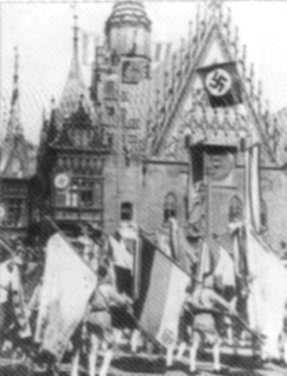
Breslau - Town Hall bedecked with Nazi symbols - 1938
Breslau's Jewish cemetery on Lohestrasse registered its last funeral on 12 August 1942 and one year later Silesia was declared Judenrien (cleansed of Jews).[p 393]
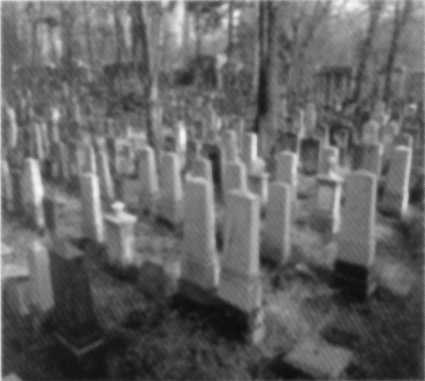
Still existing Jewish cemetery of Breslau. How many ancestors lie buried here? [p. 460, insert]
Breslau surrendered to the Soviet advance at 6 pm on 6 May 1945, and from then on German Breslau, like Jewish Breslau ceased to exist, and the birth of Polish Wroclaw had begun. [p. 405]
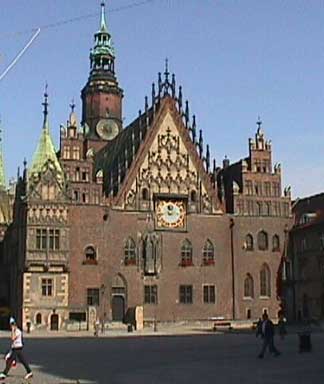
Wroclaw Town Hall 2005
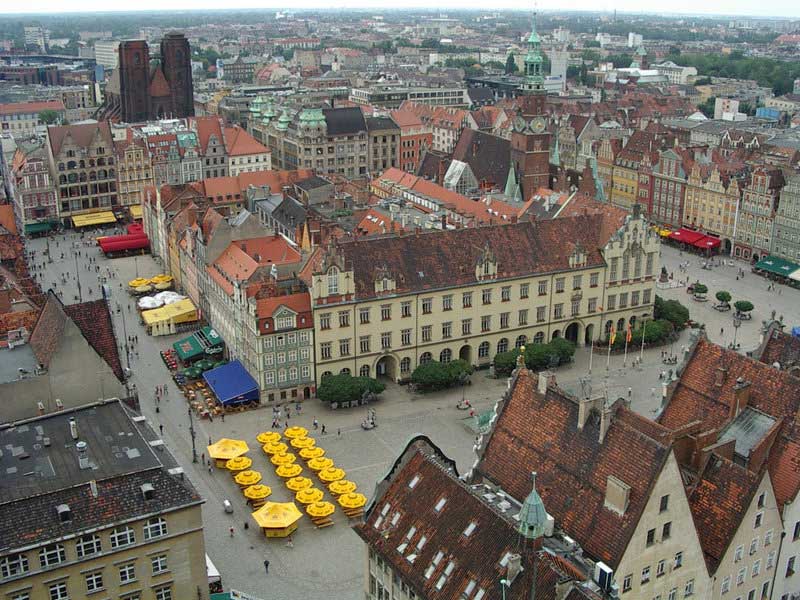
Wroclaw 2005